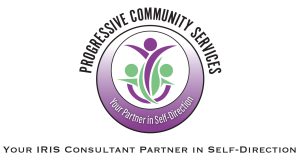The six domains of self-direction are an integral part of the work of the PCS IRIS Consultants (ICs). The six domains include:
- Health and Safety: PCS ICs develop support plans that ensure the health and safety of their participants. Support plans are developed based on the accurate assessment of a person’s independent daily living skills, behavioral, medical, vocational, and transportation needs. Each plan ensures that the health and safety of each person is addressed with the appropriate services needed to address each person’s needs. PCS staff are compliant with Medicaid (MA) requirements which include, but are not limited to, having a face to face visit with the person at least every three months as well as contact with someone on the person’s team monthly. All PCS staff are mandatory reporters and know the process of completing a DHS Critical Incident Report as required.
- Having a Place of One’s Own: All PCS participants have a place of one’s own as defined as “living in a home owned/rented of their own including living with family members.” Almost all PCS participants live in the community in a home with lease or title in their name (or their family’s name). People living in the community and being neighbors with all community members is a priority of community living. PCS works in partnership with participants, their families and their providers to assure that people continue to be able to live in their homes rather than being institutionalized. PCS also provides support to participants who are living in a one or two-bed Adult Family Homes based on the person’s self-directed decision to live there.
- Community Membership: PCS ICs are skilled in helping develop self-directed support plans that identify the possibilities for community inclusion; leverage natural unpaid supports to increase inclusion, and respect the participants’ choices in how widely he/she is involved in the broader community. From Special Olympics to faith communities, to horseback riding and volunteer activities, PCS participants have chosen access to a wide variety of community memberships.
- Relationships: PCS participants are active in their community, and developing relationships through these connections. Family relationships are benefited from the respite of community activities as well as community networks that are developed by participating in community activities. PCS started several groups to assure people have the opportunity to form relationships with others including the Breakfast Club and the Walking Club. Annual trips to see the Brewers is always a favorite.
- Employment: Achieving employment for PCS participants, is a high priority. PCS works closely participants and their vocational providers to assure that each person is employed as much as they want and can. Often people have more than one employer to assure they are working the number of hours they want. PCS utilizes DVR as a partner when appropriate to assure additional resources are maximized to reach this outcome. People with disabilities working in the community helps provide people a purpose through their contributions to society. Earning income helps to give value to a person’s time. Working also allows people an additional means to be a part of a community working towards a common goal.
- Control Over Transportation: Three of the six domains of self-direction (Employment, Community Membership and Relationship) would be at risk without transportation. People with disabilities must have the ability to move in their community to assure integration in the community. PCS has worked with the statewide medical assistance transportation program (MTM) as well as local providers (Metro Paratransit and Transit Solutions among them) to assure that participants’ have control over their transportation in a cost-effective and efficient way.
